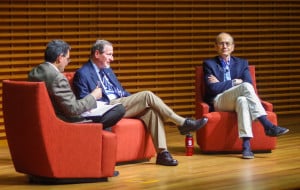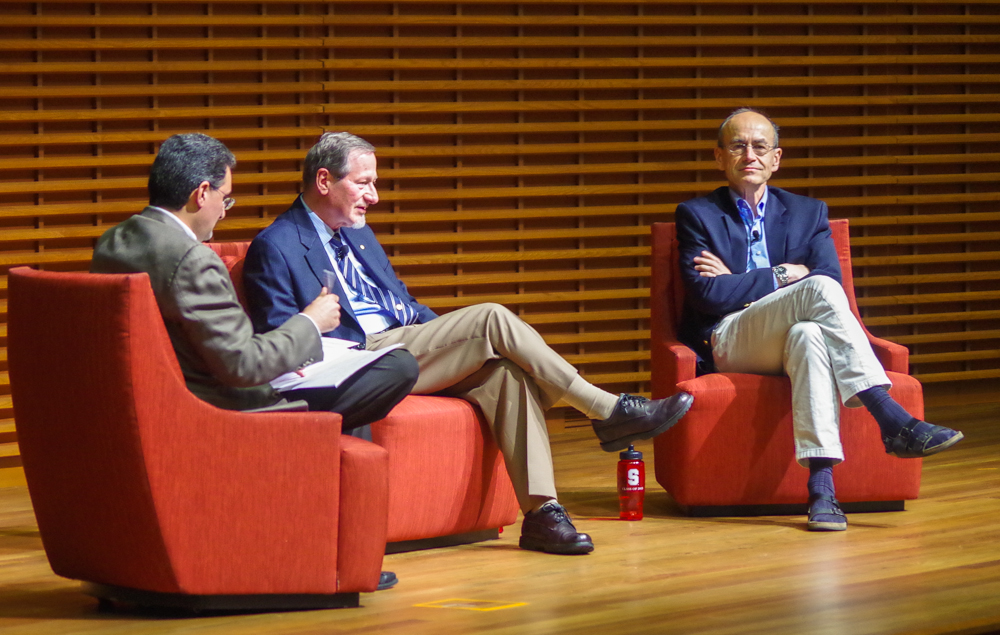
Professor Emeritus of Physics Douglas Osheroff and Professor in the School of Medicine Thomas Südhof were invited to speak for the third and final installment of the Class of 2015’s Junior Speaker Series, “Intelligence for Impact: A Nobel Laureate Panel,” in Cemex Auditorium on Monday night.
Osheroff, winner of the 1996 Nobel Prize in Physics, and Südhof, winner of the 2013 Nobel Prize in Physiology or Medicine, were asked a series of questions by Professor of Computer Science Mehran Sahami ’92 M.S. ’93 Ph.D. ’99, who moderated the event.
Main themes of the talk included the passion and determination behind research, the need for innate curiosity for great discoveries and changes and challenges in the world that have yet to be fully addressed.
Both professors agreed that energy production and the transition away from fossil fuels are among the greatest of challenges society faces today. Südhof recognized the significance of reducing pollution and finding alternative energy resources.
“Life certainly is filled with huge challenges, like trying to understand diseases of the brain,” Südhof said. “However, those challenges pale in importance, I believe, compared to this overall change in the world and our planet that seem to be quite overwhelming. It’s a major technological challenge that doesn’t only revolve around energy; it revolves around societies.”
Taking action to accomplish major goals by first clearly defining their motivations is key to progress, Südhof said.
“The essence of science is that you study something because you want to find what the truth about that something is,” Südhof said. “As a scientist you are trying to find out what is the truth about a certain subject…in order to deliberate on what needs to be done in the future, you need to get the best assessment possible of the actual facts.”
Osheroff’s definition of research complements Südhof’s definition of science as a process of intrigue. Osheroff shared that his high school chemistry teacher’s metaphor for research has stayed with him to this day.
“He came to class one day and he had milk cartons,” Osheroff said. “Research is like trying to figure out what’s inside the milk cartons. Every time you do an experiment, you’re asking a question of nature. Nature has to answer your questions. Nature’s answers aren’t like what’s inside the milk carton, but something about what’s inside the milk carton.”
In response to what it takes to become a successful scientist or researcher, Südhof put curiosity before intellect.
“Intelligence is often overrated,” he said. “The best predictor of success is how innately curious the person is. That has been a better predictor than anything else I have seen for actually doing something interesting.”
Junior Class President Jordan Shapiro ’15 planned for the event to focus more on the life of the laureates than on academia.
“The purpose of the panel is not to convince our student body to pursue academia or to aspire for a Nobel Prize,” Shapiro said. “Rather, we want to focus on where these leaders were during their undergraduate years and the unpredictable path that lay ahead of them before they really achieved this excellence.”
Rohit Talreja ’15, a junior class cabinet member and one of the main organizers for the event, noted a discrepancy between how much Stanford speaks about its Nobel laureates and how much students get to actually interact with them.
“I hope students will get inspiration from this and use their education for solving real-world problems,” Talreja said. “I hope the laureates will give us inspiration for tackling problems of our generation by sharing their experiences with accomplishing things on a larger scale.”
Contact Angelique Dakkak at angeldak ‘at’ stanford ‘dot’ edu.
